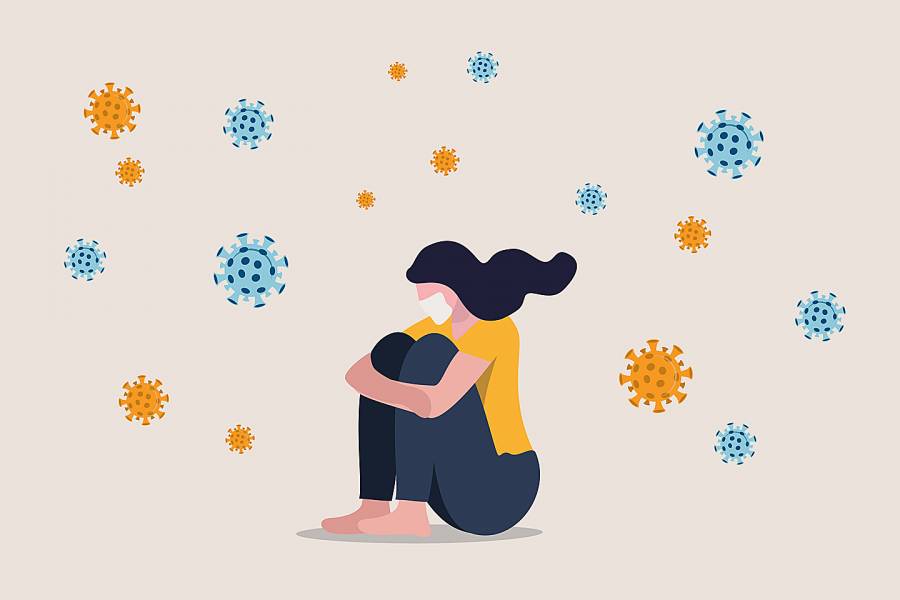Recognizing that October is Depression Awareness Month and that faculty, staff, and their household family members may be especially impacted by depression during this global pandemic, Johns Hopkins wants to remind you that mySupport counselors are available 24/7, 365 days a year, to assist with emotional support and daily life assistance; to reach a counselor, call 443-997-7000, option 2. In addition, the university is offering a wide range of depression-focused resources that includes webinars, videos, articles, and online screening tools.
What resources are available to me, my family, my co-workers, and my team?
Webinar for managers (meets CDC Scorecard requirements)
Helping Managers Recognize and Respond to Depression in the Workplace. Relationship or work challenges, grief and loss, or local or national crises can leave us feeling blue. This sadness is a normal part of the human experience. When a range of other symptoms accompany the sadness and last for weeks instead of days, the "blues" may have developed into clinical depression. Depression often impacts multiple areas of life, including productivity and behavior at work. Join a mySupport clinician to learn about depression, its impact on the workplace, and how managers can help employees whose work performance may be affected by it. Sign up in advance for one of these webinars:
- Register here for Tuesday, Oct. 1, noon to 1 p.m.
- Register here for Thursday, Oct. 22, 4 to 5 p.m.
- Register here for Wednesday, Oct. 28, 4 to 5 p.m.
Webinars for all on understanding and managing depression
Understanding and Treating Depression. Clinical depression is a medical disorder that affects approximately 11 million American adults each year. Join a mySupport clinician to learn about the risk factors, signs, and symptoms, as well as effective treatment options for you or someone you care about. The webinar will take place from 4 to 5 p.m. on Wednesday, Oct. 14. Click here to register.
Coping and Thriving Webinar Series: Depression Awareness Month. Click here to discover upcoming sessions to help you cope and adjust to these overwhelming and difficult times. Topics include finding comfort beyond the comfort zone, recognizing depression, and understanding and treating depression.
MyStrength app. Click here to access the myStrength portal using the access code JHU or JHHS. This app has a mood tracker and evidence-based modules for mood and anxiety management.
Articles, videos, and resources on depression. Click here for articles on depression, depression resource center videos, and information on the Depression and Bipolar Support Alliance, Anxiety and Depression Association of America, and other organizations.
Articles, videos, and resources on suicide and how to help someone who's having suicidal thoughts. If you or someone you know is in crisis, you can reach out to mySupport or the National Suicide Prevention Hotline at 800-273-TALK (8255). Click here for articles to help understand and prevent suicide, the suicide resource center, and additional national suicide resources.
Talk Saves Lives training. Talk Saves Lives is an online tool designed to help you understand suicide and know its warning signs. Then you can start the conversation. Click here to start the training.
Online depression screening. Depression is more than feeling sad or blue. Real depression gets in the way of you being you. It can stem from family history, a life event, a health condition … or no reason you can understand. Whatever the cause, depression is treatable. And you've got support along your journey.
If you are ready to check in on how you are feeling, try the depression check. It's just 10 simple questions to help you tune in to your feelings. Click here to take the assessment. Following the assessment, contact mySupport to connect with an on-site clinician by calling 443-997-7000, option 2, or schedule an appointment.
How can I get emotional support for myself or a family member immediately?
To receive emotional support in the moment, call 443-997-7000 and press option 2. You will be connected to a clinician who will provide free and confidential emotional support, and can help you identify resources and next steps.
What if I am a manager concerned about a member of my team or my whole team related to race and emotional well-being?
Click here for information on consulting with a mySupport on-site clinician, referring employees to mySupport directly, making a referral, informal referrals, and crisis response services.
Any other suggestions?
Movement is vital in supporting your overall health and well-being. JHU Wellness Programs provides an array of classes to get your endorphins going and to energize you. Registration is open for the next session of JHU virtual wellness classes starting Oct. 1. Try a mix of Tai Chi, Cardio Fusion, Mindfulness Meditation, Muscle Toning & Conditioning, Strong Nation, Zumba, and a variety of yoga classes to enliven your wellness routine. For only $20 per month you can take as many classes you'd like, so try something new. Visit JHU Wellness Programs to register. Contact wellnessprograms@jhu.edu with questions.
Posted in Health+Well-Being








